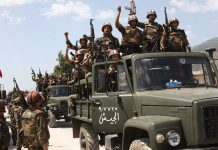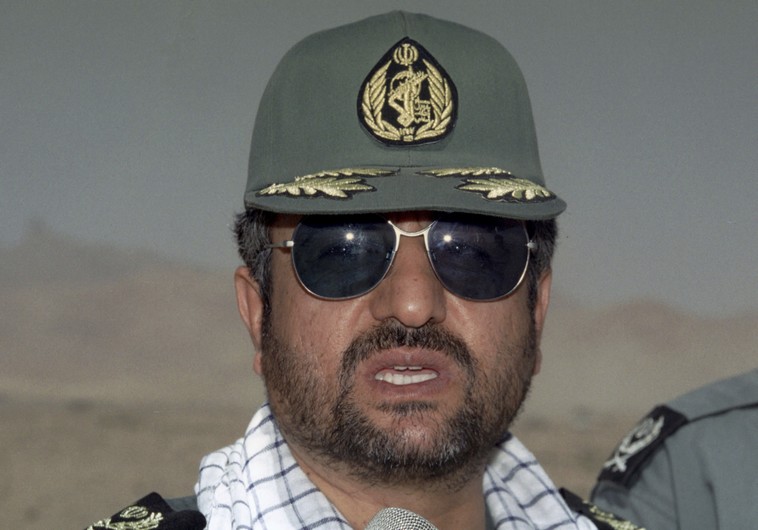Iran’s military chief voices support for nuclear deal despite prior skepticism
REUTERS/J.Post/08/08/2015/
Iran’s military chief and a close ally to the Supreme Leader expressed his support on Saturday for the country’s nuclear deal with world powers, a key endorsement for the accord that faces strong opposition from hardliners. Conservative members of the Iranian parliament and chief commander of the elite Revolutionary Guards, Mohammad Ali Jafari, have sharply criticized the deal, saying it undermined the Islamic Republic’s military capabilities. While Supreme Leader Ayatollah Ali Khamenei has not publicly approved or disapproved of the deal, he has told officials and experts to take legal procedures to ensure the other side does not breach it, saying some of the world powers involved were untrustworthy.
Major General Hassan Firouzabadi listed 16 “advantages” to the deal, which Iran signed in Vienna in July, without detailing any drawbacks. “The armed forces have the most concerns about the effect of the deal on Iran’s defense capabilities … but this agreement and the U.N. Security Council resolution have many advantages that the critics ignore,” Firouzabadi was quoted as saying by Fars News Agency. The agreement, a major initiative for both US President Barack Obama and Iran’s pragmatic President Hassan Rouhani, has been met with resistance from hardliners in both countries.
“The tone of the UN Security Council resolution has changed compared to the previous ones. Regarding Iran’s missile activities, it doesn’t order but only asks for Iran’s compliance,” Firouzabadi said, referring to an international resolution passed in the wake of the deal. Iran’s procedures for ratifying the accord are not known in any detail. Whatever the eventual role of parliament or the National Security Council, the deal will have to be approved by Khamenei, the country’s highest authority.
Ex-National Security Advisor: Iran nuclear deal likely will lead to use of force
YAAKOV LAPPIN/J.Post/08/06/2015
The Vienna agreement signed between world powers and Iran will “likely and necessarily lead to the use of force against Iran, at some stage or another, in order to halt its race toward a nuclear weapons program,” the former national security adviser to Prime Minister Benjamin Netanyahu, Maj.-Gen. (res.) Yaakov Amidror, has warned.
In a detailed paper published by the Begin-Sadat Center for Strategic Studies at Bar Ilan University, where Amidror is a senior research fellow, he wrote, “It is clear that the agreement was signed in order to delay the Iranian nuclear bomb program, not to end it. And thus, when the program rears its head again it will be a problem several times more serious and far harder to deal with.”He added, however, that “there is no cause for hysteria. The agreement will not bring about Israel’s downfall, and in the best case scenario may even buy Israel some time to better prepare for confronting the Iranian challenge. Nevertheless, the map of reality should be read correctly, and not through rose-tinted glasses… The reality facing Israel (and the world) following the signing of the agreement is significantly more threatening than before.”
Amidror has served 36 years in senior IDF posts, including as commander of the Military Colleges, military secretary to the minister of defense, director of the Intelligence Analysis Division in Military Intelligence, and chief intelligence officer of the Northern Command.In his latest paper, he argued that it is impossible to claim that the agreement should be supported even if it is imperfect, since it has put the region on a path to military confrontation with a future Iran that will be significantly more powerful. This “will take place in far worse conditions than before the agreement, against a far stronger Iran,” he cautioned.
“The Vienna agreement has made the situation more complex and dangerous, not less so. Even if Iran completely abides by the terms of the agreement, when restrictions and sanctions come to an end fifteen years hence, it will emerge much stronger, militarily and economically. This situation will almost assuredly lead to the use of force against Iran, because Iran undoubtedly will try to produce nuclear weapons; be much better able to withstand foreign pressures; and hold significant sway across the Middle East. The conflict that will ensue will take place in conditions far worse from a Western perspective than before the agreement, pitting the West (and/or Israel) against a much-stronger Iran,” he wrote.
Looking at the agreement itself, Amidror said it allows Iran to keep its military nuclear program, achieve sanctions relief, and gain international legitimacy. “As a basis for discussion it is important to emphasize that the Iranian nuclear program has no civilian element, and no justification other than as a military program. This is the consensus of all the international experts, some of whom will only say so privately, but most of whom are explicit in this. There is no serious expert who thinks that Iran is developing its capabilities for civilian purposes,” said Amidror.
“On the basis of this understanding, which was accepted by the American experts as well, American policy was initially clear: the
agreement should dismantle Iran’s nuclear capabilities. This was the term used by the Americans themselves. But at some stage the US decided to move from a policy aimed at dismantling Iran’s nuclear capability, to a policy aimed at delaying Iran’s ability to achieve nuclear weapons by ten to fifteen years,” he added.
From the moment that the policy in Washington changed, and there was no longer any intention of actually dismantling Iran’s nuclear capabilities, it was clear to the Americans that it would be impossible to include Israel in the negotiations. The US therefore shifted to conducting secret negotiations that it hid from Israel, he recounted.
“As soon as the US decided to make do with delaying Iran’s getting the bomb, by a fixed time period, then Israel was left on the outside – not because of the strained relations between the president and the prime minister, but because of significant differences of opinion. Subsequently, although the American negotiators did make use of Israeli experts, Israel was not involved in the central deliberations,” Amidror said.
Now, Israel must maintain its freedom of action, the former national security adviser stressed. “The fact that the powers signed an agreement must not be allowed to paralyze Israel. The country’s security is at stake, and on this issue we should take the advice of the current president of the US: ‘Israel must be able to defend itself, by itself; even if the agreement makes this a more complex proposal.”Amidror predicted that Iran will keep to the agreement during its early stages of implementation of one to two years.
“During this period Iran’s supreme interest will be the lifting of sanctions. Around 60% of the agreement deals with the lifting of
sanctions and the dismantling of the mechanisms used to enforce them. The removal of sanctions will allow Iran to rebuild and significantly strengthen its economy as billions will flow into Iran, even though a proportion will be lost to the dark abyss of entrenched Iranian corruption,” he wrote.
“The lifting of sanctions will also serve to release a great amount of Iran’s energy and money which can be redirected toward furthering its interests in the Middle East and beyond. Here, the beneficiaries will be Iran’s allies – Hezbollah, Hamas, the Alawites in Syria, and the Houthis in Yemen. For all these reasons it can be expected that, initially, Iran’s efforts will be invested in removing the burden of sanctions and becoming stronger, both internally and externally.”
After this initial stage, two possible and realistic scenarios emerge. In the first scenario, Iran will feel sufficiently strengthened to begin to cheat, ” initially on peripheral issues, and then as they gain confidence, on more substantial issues.”
Simultaneously, as other problems arise elsewhere in the world, “the quality of intelligence about Iran will deteriorate,” Amidror said. “After a while, once it is seen that Iran is indeed keeping to the agreement, there will naturally be a slow but steady transferal of intelligence resources to other burning problems… Against a state with which there is a signed agreement, intelligence operations are conducted at a lower level of risk. A complicated operation that, if discovered, might embarrass the US will be authorized for a hostile, dangerous state, but not for one with which a signed agreement exists.””The result,” he said, “will be potentially disastrous for the agreement.”
“It is clear that Iranian cheating will not take place at the declared facilities which are under IAEA inspection, but at sites unfamiliar to the international community, whose location can only be discovered through gathering high-quality intelligence. The combination of the American concession on surprise inspections of such sites, and the inevitable decline in intelligence quality, offers an excellent foundation for successful Iranian cheating,” he said.
“The IAEA, for its part, will be as unwilling as in the past to make use of external intelligence (even when presented with it) in order to conduct non-agreed inspections of sensitive facilities, out of fear of being accused of acting as an agent of Israel or the US. Hence it will need to invest a great deal of time and effort in order to build an independent dossier that will stand up to scrutiny, which will be sufficient for it to conduct more confrontational inspections at undeclared facilities. It is difficult to see how the IAEA might develop such capabilities.”
All of this has led Amidror to cast doubt on the American claim that “a year will be sufficient in order to respond appropriately” to
Iranian cheating. “It is not difficult to imagine US intelligence staff presenting information about Iranian violations and being rebuffed by decision-makers, using learned explanations. This would continue until they provide the impossible ‘smoking gun,’ or until it is simply too late. In most similar cases intelligence services have needed more than a year from the moment at which a violation begins in order to identify it, understand it, and persuade the decision makers about it, and for these to then decide and act,” he warned.
“Based on the experiences in almost all similar cases in the past, it must be assumed with a high degree of probability that if the Iranians make an effort to cheat and to hide the evidence, it is almost certain that they will be able to develop their first nuclear device before the West can respond.” Alternatively, Iran will abide by the agreement to the letter, until the end of the 10 – 15 year sunset clause. “They will not cheat, but will use the time to expand their knowledge and capabilities, in theory and in practice,” he wrote.
“In such a scenario it is reasonable to assume that at the end of the period, after more than a decade, Iran will have the expertise to produce centrifuges that are 10 or 20 times faster. This is a very realistic prospect, and seemingly would not represent a violation of the agreement, as long as it is done with the appropriate caution,” Amidror added. Since the embargo on conventional weapons will be lifted after five years, the Iranians will work to significantly improve their anti-aircraft defenses. They can expect help from Russia, which needs the money to be gained from these projects, which are defensive in nature and therefore “acceptable.”
Three years later the embargo on the Iranian missile project will also be lifted, and Iran will make every effort to progress in its development and production of precise missiles, particularly long-range ones that would allow it to threaten Europe initially (at a very early stage), and later the US. According to Amidror, there is little doubt that within ten years, and certainly once the embargo is lifted, Iran will achieve these capabilities. It will be better protected from any aerial threat, and able to carry out missile strikes on many areas of the world.
“In parallel, determined efforts will be made to develop the Iranian economy so that, after a decade, it will be able to withstand outside pressures. For example, Iran will stockpile spare parts for sensitive systems, Iranian banks will hold more foreign currency, and there will be more partnerships with large international companies – making any future sanctions program more difficult.
In short, all the lessons will be learned from the last sanctions regime, and Iran will be better prepared for a similar situation in
the future,” he argued. Hezbollah will receive thousands of precise missiles, while enjoying Iranian backing and Hamas will receive more aid. These organizations will feel stronger being supported by the new regional superpower, Iran, and will thus be less hesitant to act. And of course, Iran’s widespread terror network around the globe (according to reports from the US State Department) will be more active than ever, as an irritant and a deterrent, he added.
Answering President Obama’s question of what the alternative is to the Vienna agreement, Amdiror said that “there is a clear answer. The alternative was increasing the pressure of sanctions, conducting stubborn negotiations, and making serious preparations for military action that would crystallize all options on the table. Together, these would achieve a better agreement… Why the six powers agreed to a bad agreement is an interesting historical question. In the meantime, we are left to deal with its consequences, which for Israel, and in my opinion for most of the world, are extremely dangerous.”





















